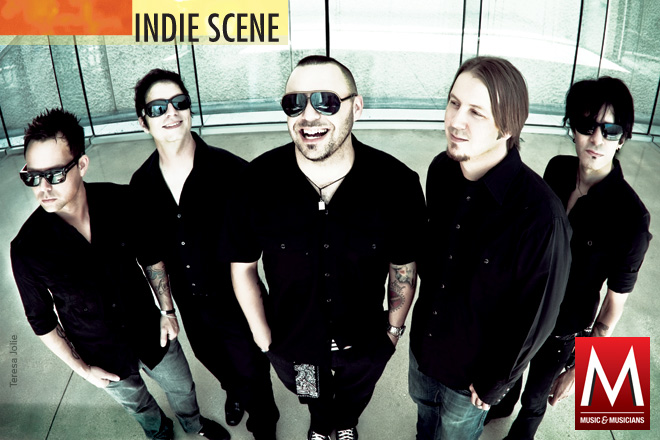 BLUE OCTOBER
BLUE OCTOBER
Fueled by domestic despair, a platinum-selling band goes its own way
Blue October leader Justin Furstenfeld doesn’t just wear his heart on his sleeve—on his band’s latest album, Any Man in America, it’s visible on practically every thread of his wardrobe. The anthemic melodies and stream-of-consciousness lyrics document in unflinching detail the unraveling of Furstenfeld’s marriage and his struggle to keep his relationship with his young daughter intact. “This was a very personal thing, and I couldn’t handle it on my own,” he says, relaxing after a long day of rehearsals for the group’s upcoming tour. “So this album was my therapeutic way of being able to deal with it.”
Indeed, Furstenfeld’s lyrics leave little to the imagination: “I’m done with holding this in/I’m done with being a friend/I’d like it all to just end,” he wails on “The Flight (LNK to MSP).” In “Drama Everything,” he’s even more blunt: “Just watch me walk away.” “I’ve always been pretty open about everything,” Furstenfeld says. “I tend to put myself out there—that way I don’t have to make any excuses later.”
He’s certainly not about to start now. Furstenfeld says the 13 tracks on Any Man represent only a sample of the 178 songs he was driven to write over the past three years. “My job is to say what you’re not supposed to say,” he insists. “I’m never going to edit anything.” However, the band—which also includes violinist and pianist Ryan Delahoussaye, lead guitarist Julian Mandrake, bassist Matt Noveskey and Justin’s brother Jeremy on drums—wasn’t so sure. “They were saying things like, ‘You’re going to ruin our career by doing this, the label’s going to drop us for doing this,’” he says. “Little did they know we were going to be dropped anyway.”
Indeed, 2009’s Approaching Normal proved to be Blue October’s last major-label release. “I’m not stupid,” Furstenfeld declares. “I’ve been doing this for 22 years. I don’t need a big label. They take 20 percent of the touring, 20 percent of your publishing, 20 percent of the merchandising. Hell, no! I’ll do it myself.”
Furstenfeld’s candor is nothing new—he has long been vocal about his battles with bipolar disorder and drug abuse, experiences that have moved him to become a spokesman for suicide awareness and addiction recovery. Even when Blue October saw platinum sales for its 2006 effort Foiled, thanks to hit singles “Hate Me” and “Into the Ocean,” Furstenfeld never shied away from sharing his demons. “I never thought songs about suicide and drug addiction could ever be hits,” he admits. “But people want to hear something real.”
Still, when Blue October’s sales leveled off Furstenfeld discovered that the group’s label suddenly lost its enthusiasm for those songs. “When we sold a million records, suddenly everybody was really nice and I was the best guy in the world,” he recalls. “Then when the next album only sold 200,000 copies, everybody wasn’t being as nice. When you’re famous, people love you for the wrong reasons.” Now the band answers only to itself—Any Man is being released on its own Up/Down Records imprint. “I never wanted to be famous,” Furstenfeld says. “I never wanted to be a rock star or to be rich. I just wanted to tell good stories and the truth of the world over some really fat beats and good hooks that people will remember.”
–Lee Zimmerman



comment closed